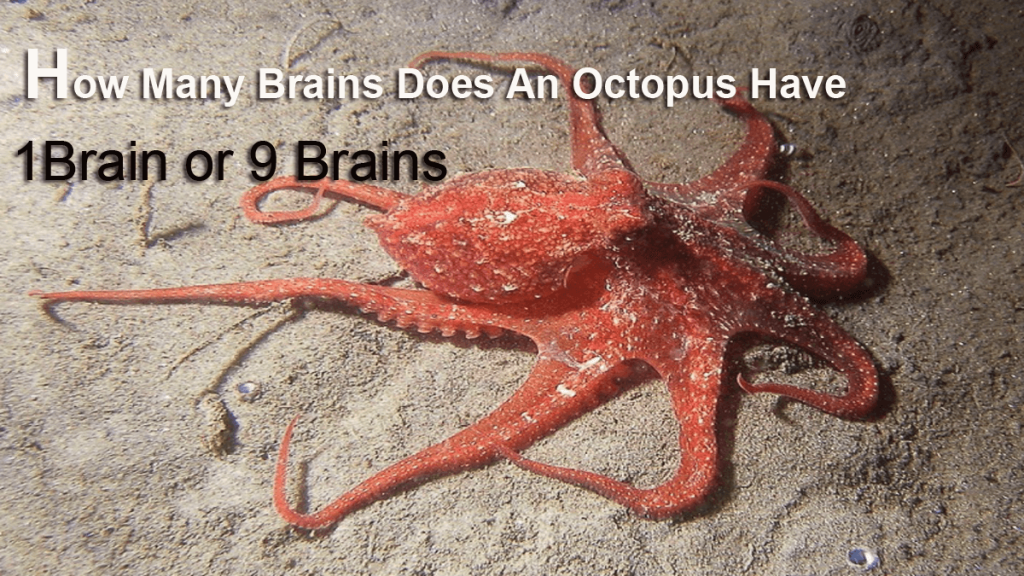
How Many Brains Does An Octopus Have: Octopuses are a type of cephalopod, which means “head-foot” in Greek. They are known for their eight arms and bulbous head, as well as their ability to change color and texture to blend in with their surroundings.
But what really sets octopuses apart is their incredible intelligence and unique anatomy, which includes not one, not two, but three hearts and a decentralized nervous system with multiple “brains.”
In this article, we’ll explore some of the most fascinating facts about octopuses, including how many brains they have and what makes them so special.
Read Also:
10 Interesting Facts About Octopus
Octopuses are fascinating creatures with a range of unique abilities and adaptations that make them one of the most intriguing animals in the ocean. Let’s explore 10 interesting facts about octopuses, including how many brains and hearts does an octopus have,
Fact 1: How Many Brains Does an Octopus Have?
The question of how many brains an octopus has is a tricky one because, technically, they don’t have any “brains” in the traditional sense. Instead, their nervous system is distributed throughout their body, with two-thirds of their neurons located in their arms.
This means that each arm has a certain degree of autonomy and can respond to stimuli on its own. As well, octopuses have a cluster of neurons in their head called the supraesophageal ganglion, which acts as a centralized control center for the rest of their nervous system.
So while octopuses don’t have a single brain like humans do, they do have multiple centers of neural processing that work together to control their behavior.
Fact 2: Octopuses Have Three Hearts
Another unique feature of octopuses is their circulatory system, which includes three hearts. Two of these hearts pump b*lood to the gills, where oxygen is exchanged, while the third heart pumps oxygenated b*lood to the rest of the body.
This system allows octopuses to have a high metabolic rate and move quickly through the water, which is especially important for predators and prey alike.
Fact 3: Octopuses Can Regenerate Lost Limbs
Like many other invertebrates, octopuses have the ability to regenerate lost limbs. If an octopus loses an arm in a predator attack or other injury, it can regrow a new arm to replace it. The process takes several weeks, but the new arm will be fully functional and nearly identical to the original.
Fact 4: Octopuses Can Escape from Tight Spaces
One of the most impressive abilities of octopuses is their ability to escape from tight spaces. Because they have no bones, they can squeeze through openings that are much smaller than their bodies would suggest.
In fact, some octopuses have been known to escape from jars and other containers with tight lids, even when the lids are screwed on tightly.
Fact 5: Octopuses Have Camouflage Abilities
Octopuses are famous for their ability to change color and texture to blend in with their surroundings. They do this using specialized cells called chromatophores, which contain pigments that can be expanded or contracted to change the color of the skin.
Moreover, octopuses can change the texture of their skin by contracting specialized muscles, which allows them to mimic the appearance of rocks, coral, and other objects in their environment
Fact 6: Octopuses are Masters of Disguise
Not only can octopuses change color and texture, but they can also change the shape of their bodies to mimic other animals or objects. This ability is called “mimicry,” and octopuses are particularly adept at it.
For example, some species of octopus can flatten themselves to look like a piece of seaweed or curl their arms to resemble a small rock.
Fact 7: Octopuses Have Excellent Vision
Octopuses have complex eyes that are similar in structure to those of vertebrates, such as humans. They can distinguish colors and shapes, and some species can even detect polarized light, which helps them navigate in the open ocean.
Additionally, octopuses have a blind spot in each eye where the optic nerve attaches, but they compensate for this by moving their eyes constantly to take in their surroundings.
Fact 8: Octopuses are Social Creatures
Although they are generally solitary animals, octopuses have been observed engaging in social behaviors in the wild. For example, some species of octopus have been seen sharing dens with other octopuses or communicating with one another through body language and color changes.
Additionally, some captive octopuses have been known to interact with their keepers and even play with toys.
Fact 9: Octopuses Have a Short Lifespan
Despite their intelligence and adaptability, octopuses have relatively short lifespans. Most species only live for a few years, with some living as little as six months. This is because they reproduce once and then die shortly afterward, a process known as “semelparity.”
However, during their short lives, octopuses can grow rapidly and reach impressive sizes, with some species reaching lengths of over 30 feet.
Fact 10: Octopuses Can Learn and Remember
Octopuses are highly intelligent animals that are capable of learning and remembering. In captivity, they have been trained to perform a variety of tasks, such as opening jars and solving puzzles, and some have even learned to distinguish between different humans.
Besides, octopuses have been shown to exhibit behaviors that suggest they can remember past experiences and learn from them, such as avoiding certain predators or recognizing individual prey.

Octopus Brain vs. Human Brain
Octopuses have a highly developed and complex nervous system, with a decentralized brain that includes a main brain and several smaller ones located throughout their body. This allows them to control their eight arms independently and perform complex tasks such as opening jars and solving puzzles. However, the human brain is still considered more complex and capable of higher-level thinking and reasoning.
Where do octopuses live?
Octopuses are found in all of the world’s oceans, from the shallow coral reefs to the deep sea. They prefer areas with rocky bottoms where they can hide in crevices and holes.
How long do octopuses live?
The lifespan of an octopus varies depending on the species, but most live for only a few years. The common octopus, for example, typically lives for around two years, while the giant Pacific octopus can live up to five years in the wild.
Do octopuses have bones?
No, octopuses do not have bones. Their bodies are soft and flexible, allowing them to squeeze through tight spaces and camouflage themselves by changing color and texture. The only hard part of an octopus’s body is its beak, which it uses to crush and break apart its prey before eating it.
- What Exactly Is an Amazing Sea Bunny Slug
- Amazing Blue-footed Booby birds
- Magnificent Things About Sea Anemone Characteristics
- Strange Facts About Frilled Shark
- Goliath Grouper Fish – Monster Fish
How many stomachs does an octopus have?
Octopuses have only one stomach. Their digestive system includes a muscular bag-like structure called the crop, which stores food before it enters the stomach. The stomach breaks down the food, and then the intestines absorb nutrients before the waste is expelled through the anus.
Why does an octopus have 3 hearts?
Octopuses have three hearts to circulate b*lood throughout their body. Two of the hearts pump b*lood to the gills, where oxygen is obtained, while the third heart pumps oxygenated b*lood to the rest of the body. This efficient system allows the octopus to have a high metabolic rate and maintain a high level of activity.
How many eyes does an octopus have?
Octopuses have two large, highly-developed eyes that are similar in structure to human eyes. They are located on either side of the head and are capable of perceiving color and depth.
How many hearts does an octopus have?
Octopuses have three hearts, as mentioned earlier. Two of the hearts pump b*lood to the gills, while the third pumps oxygenated b*lood to the rest of the body.
- Sea Bunny Slug Facts & Cute Secrets: Discover the Tiny Ocean Creatures That Look Like Fluffy Rabbits
- World Whale Day 2024: Celebrating These Magnificent Creatures
- Celebrating National Polar Bear Day 2024: Raising Awareness for the Arctic Icon
Q: How many brains does an octopus have?
A: Octopuses don’t have a single brain like humans do. Instead, their nervous system is distributed throughout their body, with multiple centers of neural processing working together to control their behavior.
Q: Can octopuses regenerate lost limbs?
A: Yes, octopuses have the ability to regenerate lost limbs. If an arm is lost, a new one will grow to replace it.
However,
Octopuses are truly fascinating animals with a range of unique abilities and adaptations. They can change color, texture, and shape to blend in with their surroundings, escape from tight spaces, and regenerate lost limbs.
They have three hearts and a distributed nervous system that allows for a high degree of autonomy in their arms.
Despite their short lifespans, they are intelligent creatures that can learn, remember, and even exhibit social behaviors.
In short, octopuses are truly one of the most interesting and mysterious creatures in the ocean.
In Addition
So, how many brains does an octopus have?
Are smarter than you thought?
How many hearts does an octopus have?
[hurrytimer id=”3809″]Fill up the blanks with your emotions in the box below, and send them to us so that we can all see them.
Thanks a lot.





